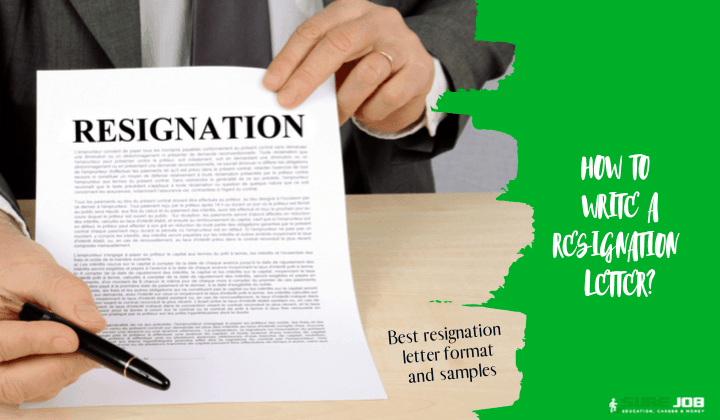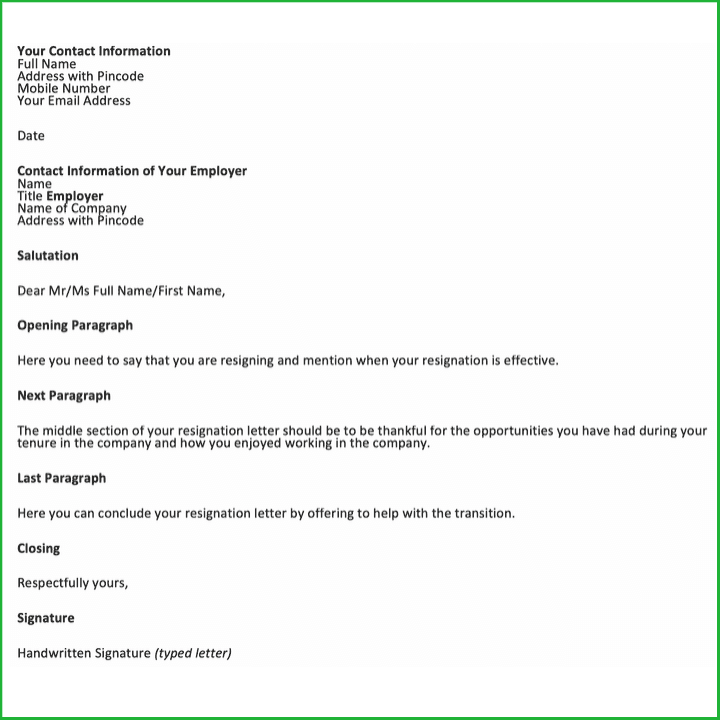Over several years of service at various levels, including top management, I’ve been through countless resignation letters. And I’ve submitted a handful of job resignation letter myself for various reasons.
With some confidence I’ll say, writing or handing over a resign letter is never a happy occasion. As employee moving to greener pastures, you may have reasons to rejoice.
Or as worker facing a loss of job for some reason, you would definitely be grieving. Whatever your condition or circumstances, writing and handing over a job resign letter is a very tough task.
Furthermore, I’ll also add that a resignation letter is a very important document for your career as well. It speaks a lot about your personality. Indeed, it can also impact your future jobs.
Why? Here’re the reasons.
Importance of Resignation Letter
In purely generic terms, the best resignation letter signifies the end of your relationship as an employee with an employer. And like any relationships in life, there’re no happy endings.
In such situations, a resign letter can serve to reduce or eliminate bitterness or anger that may exist or arise between an employer and yourself.
Though you may have been an excellent employee and your employer happy with your work, resignation changes it all. Consciously or subconsciously, it leaves a sense of guilt among both.
An employee feels guilty about leaving a workplace that brought them to a position to get a better job. The employer feels guilty for inability to retain your services for the organization.
Furthermore, a prospective or new employer would demand to see your resign letter and know its contents.
A resignation letter sample with three to five sentences would have sufficed to leave a job. But when a new or prospective employer reads that resign letter, they would be able to find your personality traits.
When you sever a relationship with an employer, it’s important to exit with goodwill. Who knows? You may have to seek a job once again with the employer.
Or your dues could be pending with a past employer. Or you might require an experience letter and excellent references.
There are several more subtle points on why a resign letter is a very important document for your career. We’ll discuss that as we go along through this article.
But first, let’s start with the basics about how to write the best resignation letter. You will find the resignation
Basics of Job Resignation Letter
As with any letter, it’s customary to mention certain details on your resignation too.
- Full name or expanded initials.
- Contact Address.
- Phone number.
- Email ID.
- Date.
All these appear on top of your job resign letter and are equally important. Your full name or expanded initials would be useful to avail services from any government agency or bank.
Contact address, phone number, and email ID is vital, should the employer need you for any issues relating with handing over of charge or to process your dues.
And above all, the date is the single most important element of your resignation letter. Because it clearly indicates whether you’re leaving without notice and duration of the notice period.
Often, new employers will ask to see your resignation letter only to check the date and notice period.
As a result, a resignation letter also serves as the record of your employment and its end with a particular company or employer.
Additionally, a resignation letter date has several more uses. It can prove useful while claiming Provident Fund or bank purposes and legal cases, if any.
Most Important Elements of Resignation Letter Format
All elements of a resignation letter are important. So let’s look at the next two elements that would feature on your resignation letter format.
Addressee
The addressee of your resignation is usually a top manager at your company. You have to address your resignation to this senior manager only, unless otherwise specified on your appointment letter or contract.
You can send a copy to your immediate senior or department chief. But usually, resignations are sent directly to the main signatory authority of a company.
Because without their acceptance and clearance, processes related to your resignation will not move forward.
A subject for Resignation Letter
The most common and obvious subject of the letter that most people write is ‘Resignation Letter’. Fine. It serves the purpose and is unpretentious.
However, by my humble opinion and experience, these two words sound rather curt and lack any empathy. Simply mentioning ‘Resignation Letter’ or similar words would lead me to an impression that a jobseeker was facing termination and hence chose to resign.
The best example of a resignation letter subject that I ever came across was in altogether in a different form. It simply said “Thanks for Every Opportunity to Develop Career”.
Obviously, this would sound more letter expressing gratitude. For an untrained eye or brain, the title would sound misleading.
But think again and read between the lines. No employee says thanks without reason. And a subject like that prompts the manager to read further and find the employee is subtly speaking about the resignation.
Job Title
This is another extremely important element of your resignation letter format. State the position or job title you’re holding while resigning. Most people tend to forget this.
They take for granted that HR departments are aware of their post. Yes, they are. But what about the next and future employers? Therefore, it’s very important to mention the position you’re holding on your resignation letter.
It’s a record that you held a position at the time of leaving the job and weren’t demoted or had to work at any other capacity.
Tenure of Service
Explicitly mention the date on which you began working with the employer and at what designation or post. If you’ve got any promotions during the tenure, mentioning your current job title, as I explain about, will help.
The tenure of your service on resignation letter also is a record of your services that can prove useful for future jobs.
It can help future employers know that you’re a dedicated worker that gets promotions and doesn’t switch jobs frequently or for small gains.
Settlement of Dues
And finally, mention a line or two about settlement of your dues with the employer you’re leaving. It doesn’t sound selfish or greedy as lots of people tend to believe.
After all, you weren’t doing charitable work for the employer. Hence, you are within rights to claim your dues such as salary, allowances, and other accruals till the date of leaving.
Furthermore, mentioning settlement of dues enables prospective and future employers to know you’re following proper exit procedures. That a company isn’t forfeiting your money for any misdemeanor.
Handing Over Charge
Usually, every employer requires you to hand over charge of your duties to someone they’ll designate. It could be an immediate senior or colleague.
Therefore, request the employer to designate a person to whom you can hand over charge of your duties, through your resignation letter.
Mentioning this also holds benefits. It proves that you’re not exiting in a hurry and are responsible. That you’re asking the employer to designate someone to take charge of your duties after you leave.
It also signifies transparency: no unscrupulous employee will ever wish to hand over charge for fear of detection of any irregularities.
Notice Period
Clearly mention the date of your resignation in the body of the letter and duration of the notice period too. And if there’s no notice period, state that too on your resignation letter. These are good for future references while applying for other jobs.
If you wish to resign with immediate effect and override the notice period, be clear about the reasons as well. Leaving a company in a hurry can often be questionable by other employers.
Annexure of Company Property
Often employees in India tend to ignore this vital part of a resignation letter format. It’s the annexure of company property you hold.
This has to be given as an attachment to the resignation letter. However, you have to clearly mention that you’re attaching an annexure with a complete list of company property at the end of your resign letter.
While working, your employer would have provided resources and equipment. This can include anything from company stationery, uniform, badges, literature, smartphone, laptop or PC or even a tie bearing company logo.
While submitting a resign letter, it’s also important to submit an annexure listing all company property you have.
Be very specific about the company property you mention on this list. For example, mention the exact number of unused letterheads, invoice books and other stationery and other stuff.
Clearly state the make, model number of the smartphone and laptop or computer your company has given.
Mention that you’re attaching this annexure just before the closing line of your resign letter.
Resignation Letter Format
You can refer the following resignation letter format to find the important points you need to write in your resignation letter.
Points to Remember in a Resignation Letter
While writing a job resignation letter, there are some points to remember.
- Never use flowery or flattering language such as ‘Respected Sir’ and ‘Esteemed Organization.’ These are archaic and betray your lack of English vocabulary. You’ll also portray yourself as subservient.
- Always thank the employer for every opportunity to learn and fine-tune your skills in a sentence or two.
- Express gratitude towards your colleagues.
- Never cite these words ‘Professional Reasons’ or ‘Personal Reasons’ since they are cryptic. They imply you’re unable to maintain professional standards of the employer.
- Or that your personal issues are a hindrance to your job. Instead, be specific. They can prove counterproductive.
- I’ll suggest you don’t cite any reason at all. If necessary to include a reason- state the real one without naming a future employer.
- Avoid words such as ‘regret’. They reflect poorly on you. If you have genuine regrets, you’d not tender your resignation.
- Don’t let words or sentences that demean yourself creep into your resign letter. Many people deride themselves in the hope that an employer would be placated while resigning.
Regardless whether you’re terminated from an organization or leaving voluntarily, it’s best to write a resignation letter format that portrays you as professional. You can use some readymade templates where absolutely necessary.
Before handing over a resign letter, seek an appointment with the person that has signed your job contract or offer letter.
And hand over your resignation to this duly authorized signatory of the company or another person authorized to accept it on behalf of the company.
Remember, you’re a resignation from a company doesn’t mean you’ve to terminate dealings. As I said earlier, resignation is the only end of an employee-employer relationship.
It doesn’t cover the entire ambit of dealings. Hence, choose words and draft your resign letter wisely.
Best Resignation Letter Samples
Download the best resignation letter samples from the links below.
| Sample 1 | Sample 2 |
| Sample 3 | Sample 4 |
| Sample 5 | Sample 6 |
| Sample 7 | Sample 8 |
| Sample 9 | Sample 10 |
Wrap Up
A proper resignation letter format helps you transit smoothly and seamlessly from one job to another. It leaves the doors of your former employer open for casual visits and at a later stage, for employment at a higher position.
A good resignation letter is like gently leaving the door open; a poorly written one is like slamming it shut on yourself and the employer. And slamming means you’re shutting the door for yourself.







